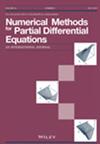Error estimates for completely discrete FEM in energy‐type and weaker norms
IF 1.7
3区 数学
Q1 MATHEMATICS, APPLIED
引用次数: 0
Abstract
The paper presents error estimates within a unified abstract framework for the analysis of FEM for boundary value problems with linear diffusion‐convection‐reaction equations and boundary conditions of mixed type. Since neither conformity nor consistency properties are assumed, the method is called completely discrete. We investigate two different stabilized discretizations and obtain stability and optimal error estimates in energy‐type norms and, by generalizing the Aubin‐Nitsche technique, optimal error estimates in weaker norms.能量型和弱规范下完全离散有限元的误差估计
本文在一个统一的抽象框架内提出了误差估计,用于分析具有线性扩散-对流-反应方程和混合型边界条件的边界值问题的有限元分析。由于既不假定符合性也不假定一致性,该方法被称为完全离散法。我们研究了两种不同的稳定离散化方法,获得了能量型规范下的稳定性和最优误差估计,并通过推广奥宾-尼采技术,获得了弱规范下的最优误差估计。
本文章由计算机程序翻译,如有差异,请以英文原文为准。
求助全文
约1分钟内获得全文
求助全文
来源期刊
CiteScore
7.20
自引率
2.60%
发文量
81
审稿时长
9 months
期刊介绍:
An international journal that aims to cover research into the development and analysis of new methods for the numerical solution of partial differential equations, it is intended that it be readily readable by and directed to a broad spectrum of researchers into numerical methods for partial differential equations throughout science and engineering. The numerical methods and techniques themselves are emphasized rather than the specific applications. The Journal seeks to be interdisciplinary, while retaining the common thread of applied numerical analysis.

 求助内容:
求助内容: 应助结果提醒方式:
应助结果提醒方式:


